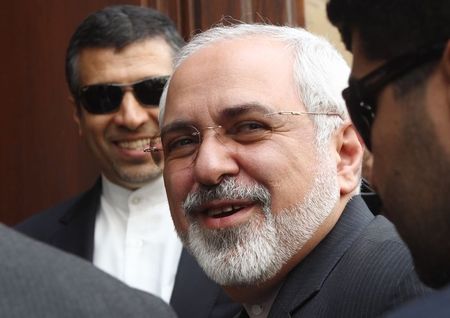Iran says it will not ‘kneel’ as nuclear talks enter crunch time

VIENNA (Reuters) – Iranian Foreign Minister Mohammad Javad Zarif took to YouTube on Wednesday to deliver a message that Iran was ready to take steps to ensure its nuclear programme remains peaceful but would not “kneel in submission” to do a deal with major powers.
As talks to resolve the long-running nuclear standoff resumed in Vienna, Zarif’s remarks, delivered in English in a slick five-minute video, appeared to be a response to a U.S. warning that Tehran has yet to prove that its atomic ambitions are peaceful.
The statements highlighted how much work the negotiators from Iran and from the United States, France, Germany, Britain, China and Russia still have to do to meet a self-imposed deadline of July 20.
The sixth round of talks since February between Iran and the six powers formally gets under way in Vienna on Thursday morning, and on Wednesday Zarif met with U.S. Deputy Secretary of State William Burns and European Union foreign policy chief Catherine Ashton, the six powers’ lead negotiator, a U.S. official said.
Washington and some of its allies have imposed sanctions on Iran over suspicions that its nuclear programme is designed to produce weapons – a charge denied by Iran, which says it is only interested in producing electricity and other peaceful projects.
In the video, Zarif said a nuclear deal would make history, and Iran was “willing to take concrete measures to guarantee that our nuclear programme will always remain peaceful”.
But he added: “To those who continue to believe that sanctions brought Iran to the negotiating table, I can only say that pressure has been tried for the past eight years, in fact for the past 35 years.
“It didn’t bring the Iranian people to kneel in submission. And it will not now, nor in the future.”
NO “DEAL AT ANY PRICE”
British Foreign Secretary William Hague struck a similarly sober tone.
“We will not accept a deal at any price,” he said in a statement. “A deal that does not provide sufficient assurances that Iran will not develop a nuclear weapon is not in the interests of the UK, the region or the international community.”
July 20 is the expiry date of an interim accord that grants Iran modest relief from economic sanctions in return for some curbs on its atomic work, but Western officials acknowledge that an extension is looking increasingly likely.
In an article in Monday’s Washington Post, U.S. Secretary of State John Kerry said Iran’s “public optimism about the potential outcome of these negotiations has not been matched, to date, by the positions they have articulated behind closed doors”.
But Iranian Deputy Foreign Minister Abbas Araqchi told Iranian media the fact that almost three weeks had been scheduled for final negotiations was “a sign the two sides are serious about driving the talks to a conclusion”.
“We’ll decide by the July 20 deadline, based on how the talks proceed, whether to extend the talks, take a pause, or even bother to continue. It is too soon to predict,” he said.
The powers want Iran to scale back its uranium enrichment programme sharply to deny it any capability to make a nuclear bomb quickly. Iran says it needs to expand its enrichment capacity to fuel a planned network of nuclear power plants.
Araqchi said that “any limitation we submit to would be short-term and on a trial basis”, ISNA news agency reported.
(Reporting by William Maclean and Mehrad Balali in Dubai and by Parisa Hafezi, Fredrik Dahl and Louis Charbonneau in Vienna; Editing by Kevin Liffey)